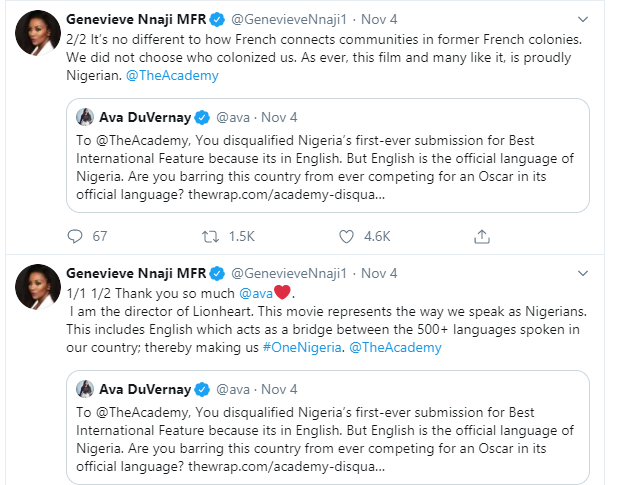The Oscars Award Academy has disqualified Nigeria’s ‘Lionheart’ from the Oscar race in the Best International Feature Film category.
The Academy dropped the movie which is Genevieve Nnaji’s directorial debut, for having too much English dialogue.
The Academy’s criteria for Best international feature film “is a feature-length motion picture (defined as over 40 minutes) produced outside the United States of America with a predominantly non-English dialogue track.”
This drop by the Oscars has reduced the number of films competing for the award to 92 from what had been a record 93 entries.
The disqualification also drops the number of female directors in this year’s race to 28, which is still a category record.
Lionheart which has been known as Best Foreign Language Film is the first film ever submitted to the Oscars by Nigeria.
‘Lionheart’, in which Nnaji also stars, is partially in the Igbo language. But it is mostly in English, which seemed to violate the category’s criterion.
The film had not been vetted by the Academy’s International Feature Film Award Executive Committee in advance of the Oct. 7 announcement of qualifying films.
One other film, Afghanistan’s ‘Hava, Maryam, Ayesha’, had been deemed ineligible before the list of qualifying films was announced.
It was denied a spot on the roster of contenders over questions about the legitimacy of the Afghan committee that submitted it.
The Academy announced the disqualification of ‘Lionheart’ to voters in the category in an email on Monday.
The film was scheduled to screen for Academy voters in the international category on Wednesday in a double bill with the Honduran entry, ‘Blood, Passion, and Coffee’.
‘Lionheart’, in which Nnaji plays a woman who tries to keep her father’s struggling company afloat in a male-dominated environment, is currently available on Netflix.
However reacting to the disqualification on Twitter, Genevieve Nnaji wrote;
“This movie represents the way we speak as Nigerians. This includes English which acts as a bridge between the 500+ languages spoken in our country; thereby making us #OneNigeria.” She added, “It’s no different to how French connects communities in former French colonies. We did not choose who colonized us. As ever, this film and many like it, is proudly Nigerian.”
American filmmaker who directed the Netflix drama miniseries When They See Us, Ava DuVernay also reacted to the disqualification. She tweeted;
“To @TheAcademy, You disqualified Nigeria’s first-ever submission for Best International Feature because its in English. But English is the official language of Nigeria. Are you barring this country from ever competing for an Oscar in its official language?”




